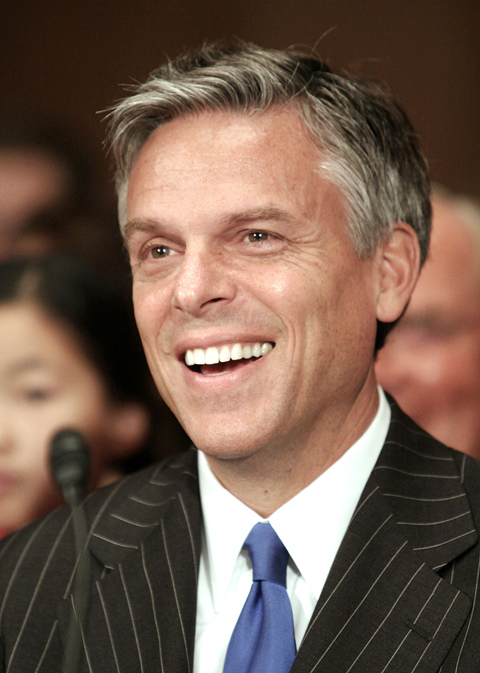US President Barack Obama’s nominee to be ambassador to China promised on Thursday to bring a “hard-headed realist” approach to relations and said he felt personally invested in the fate of Taiwan.
Utah Governor Jon Huntsman, who is fluent in Mandarin and Hoklo, told the Senate Foreign Relations Committee that the sometimes difficult 30-year diplomatic relationship was in “an exceptionally exciting time.”
“But I also am a hard-headed realist about what it’s going to take to manage this relationship or being part of that team in circumnavigating the challenges ahead,” said Huntsman, 49, who is expected to win easy confirmation.

PHOTO: AP
The governor, who had been floated as a possible 2012 Republican challenger to Obama, said he would work to improve Sino-US economic and military relations and bolster cooperation on issues such as climate change and North Korea.
“We need to continue working closely with China to convince North Korea to abandon its nuclear weapons program,” Huntsman said, just hours after Pyongyang declared denuclearization talks dead.
However, Huntsman named Taiwan, human rights and Tibet among the “areas where we have differences with China” and vowed “robust engagement” on human rights if confirmed.
The governor, who lived in Taiwan as a Mormon missionary, said he felt “personally invested in the peaceful resolution of cross-strait differences, in a way that respects the wishes of the people on both Taiwan and the mainland.”
He said that current US policy “supports this objective, and I have been encouraged by the recent relaxing of cross-strait tensions.”
The governor received warm praise from senators of both parties, and the committee was expected to refer his nomination to the full Senate quickly for confirmation before lawmakers leave for a month-long recess on Aug. 7.
Relations between Washington and Beijing have taken on rising importance in the last decade as China has embraced its role as a leading global economy and has pushed for regional security amid tense standoffs with North Korea.
Asked about persistent US complaints that China’s currency is artificially cheap, giving its exports a boost, Huntsman said Beijing had made progress on trade imbalances and on the value of its money.
“It is our every hope and desire and, indeed, our intent at the negotiating table to ensure that progress is made in this particular area,” the governor said.
He also said he hoped that Beijing would curb arms sales to conflict-ravaged areas of Africa and urged China to “work with us to address governance and development concerns in places like Sudan, Burma [Myanmar] and Zimbabwe.”
There were moments of levity, too, as when Huntsman acknowledged senators’ praise and declared: “I hope I do as well at my funeral. I’m not sure that I will.”
The Utah governor, a former ambassador to Singapore, noted that he had two adopted daughters, one from China and one from India, and quipped: “Happily, no border disputes yet surrounding their bedrooms.”

DAREDEVIL: Honnold said it had always been a dream of his to climb Taipei 101, while a Netflix producer said the skyscraper was ‘a real icon of this country’ US climber Alex Honnold yesterday took on Taiwan’s tallest building, becoming the first person to scale Taipei 101 without a rope, harness or safety net. Hundreds of spectators gathered at the base of the 101-story skyscraper to watch Honnold, 40, embark on his daredevil feat, which was also broadcast live on Netflix. Dressed in a red T-shirt and yellow custom-made climbing shoes, Honnold swiftly moved up the southeast face of the glass and steel building. At one point, he stepped onto a platform midway up to wave down at fans and onlookers who were taking photos. People watching from inside

A Vietnamese migrant worker yesterday won NT$12 million (US$379,627) on a Lunar New Year scratch card in Kaohsiung as part of Taiwan Lottery Co’s (台灣彩券) “NT$12 Million Grand Fortune” (1200萬大吉利) game. The man was the first top-prize winner of the new game launched on Jan. 6 to mark the Lunar New Year. Three Vietnamese migrant workers visited a Taiwan Lottery shop on Xinyue Street in Kaohsiung’s Gangshan District (崗山), a store representative said. The player bought multiple tickets and, after winning nothing, held the final lottery ticket in one hand and rubbed the store’s statue of the Maitreya Buddha’s belly with the other,

‘NATO-PLUS’: ‘Our strategic partners in the Indo-Pacific are facing increasing aggression by the Chinese Communist Party,’ US Representative Rob Wittman said The US House of Representatives on Monday released its version of the Consolidated Appropriations Act, which includes US$1.15 billion to support security cooperation with Taiwan. The omnibus act, covering US$1.2 trillion of spending, allocates US$1 billion for the Taiwan Security Cooperation Initiative, as well as US$150 million for the replacement of defense articles and reimbursement of defense services provided to Taiwan. The fund allocations were based on the US National Defense Authorization Act for fiscal 2026 that was passed by the US Congress last month and authorized up to US$1 billion to the US Defense Security Cooperation Agency in support of the

HIGH-TECH DEAL: Chipmakers that expand in the US would be able to import up to 2.5 times their new capacity with no extra tariffs during an approved construction period Taiwan aims to build a “democratic” high-tech supply chain with the US and form a strategic artificial intelligence (AI) partnership under the new tariffs deal it sealed with Washington last week, Taipei’s top negotiator in the talks said yesterday. US President Donald Trump has pushed Taiwan, a major producer of semiconductors which runs a large trade surplus with the US, to invest more in the US, specifically in chips that power AI. Under the terms of the long-negotiated deal, chipmakers such as Taiwan Semiconductor Manufacturing Co (TSMC, 台積電) that expand US production would incur a lower tariff on semiconductors or related manufacturing